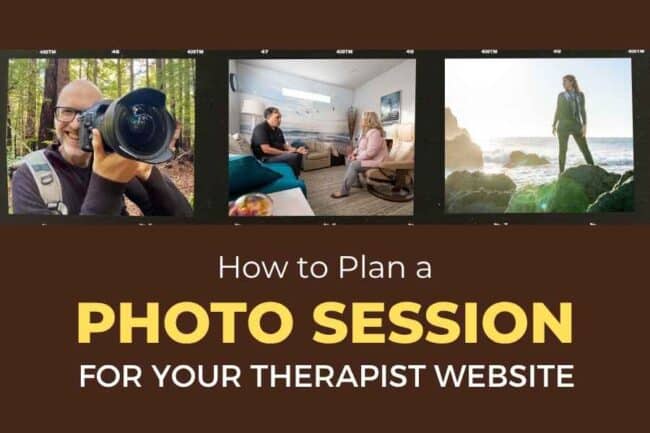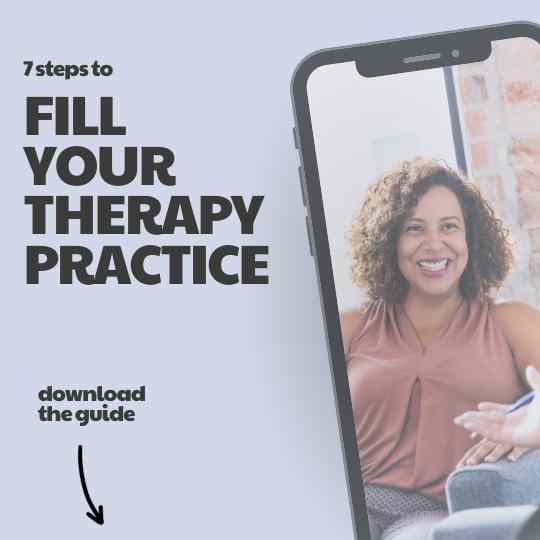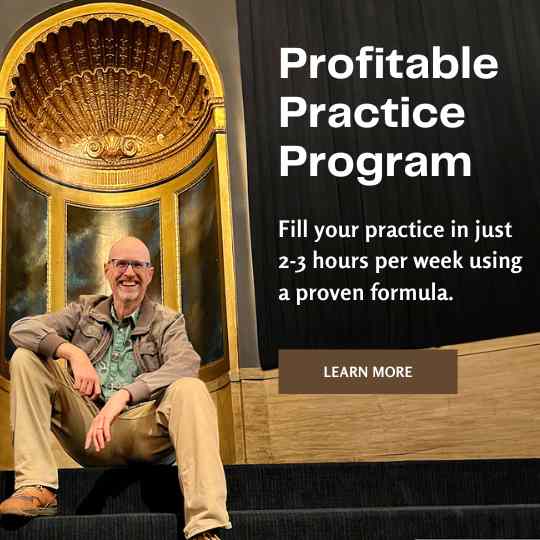Social media marketing has become an essential part of any business or professional’s marketing strategy, and therapists are no exception. Social media platforms offer therapists an opportunity to connect with potential clients, engage with their audience, and establish themselves as thought leaders in their field. However, social media for therapists can be daunting for those who are unfamiliar with the various platforms and strategies available.
Understanding social media is the first step in developing a successful marketing for therapists strategy. Social media marketing involves using social media platforms to promote your brand, engage with your audience, and ultimately drive traffic to your website or practice. While social media marketing can be an effective way to attract new clients, it is important to remember that it is not a quick way to get new clients. Building a successful social media marketing strategy takes time and effort, but the benefits can be significant.
Why therapists need social media marketing is a question that can be answered in several ways. Firstly, social media platforms offer therapists an opportunity to connect with potential clients who may not have otherwise found them. Secondly, social media marketing can help therapists establish themselves as thought leaders in their field by sharing valuable information and insights with their audience. Finally, social media marketing can help therapists build a professional network and connect with other professionals in their field. By understanding the benefits of social media marketing, therapists can develop a strategy that is tailored to their needs and goals.
Key Takeaways
- Social media marketing is an essential part of any therapist’s marketing strategy.
- Understanding social media marketing is crucial to developing a successful strategy.
- Social media marketing can help therapists connect with potential clients, establish themselves as thought leaders, and build a professional network.
Understanding Social Media Marketing
Social media marketing is a powerful tool that can help you grow your therapy practice. It is a form of digital marketing that involves using social media platforms to promote your services, build your brand, and connect with potential clients.
Through social media marketing, you can reach a wider audience and engage with them in a more personal way. By creating and sharing valuable content, you can establish yourself as an expert in your field and build trust with your followers.
One of the key benefits of social media marketing is that it allows you to target your ideal market. You can use demographic and psychographic data to create highly targeted ads and content that resonates with your audience. This can help you attract more of the right clients and grow your practice more quickly.
To be successful with social media marketing, it is important to have a clear strategy in place. This should include identifying your target audience, setting goals, and creating a content calendar. You should also choose the right platforms for your practice and tailor your content to each platform.
Some popular social media platforms for therapists include Facebook, Instagram, and LinkedIn. Each platform has its own strengths and weaknesses, so it is important to choose the ones that align with your goals and target audience.
Overall, social media marketing can be an effective way to grow your therapy practice and connect with potential clients. By understanding the basics of social media marketing and creating a solid strategy, you can take advantage of this powerful marketing platform and achieve your business goals.
Why Therapists Need Social Media Marketing
As a therapist, you may think that your practice can survive without social media marketing. However, in today’s digital age, having a robust online presence is essential for growing your therapy business and professional reputation.
Here are a few reasons why therapists need social media marketing:
1. Reach a Wider Audience
Social media platforms such as Facebook, Twitter, and Instagram have billions of active users. By creating a social media presence for your therapy practice, you can reach a wider audience than traditional marketing methods. You can connect with potential clients in your local area and beyond, and even target specific demographics based on interests, age, and location.
2. Build Trust and Credibility
Social media is a great way to build trust and credibility with potential clients. By sharing helpful tips, resources, and insights related to mental health, you can position yourself as an expert in your field. Sharing your personal and professional experiences can also help to humanize your therapy practice and make it more relatable to potential clients.
3. Increase Brand Awareness
Social media marketing can help to increase brand awareness for your therapy practice. By consistently posting high-quality content, you can stay top-of-mind with potential clients and increase the chances of them choosing your practice over competitors. You can also use social media to showcase your unique selling points, such as your therapy approach or areas of specialization.
4. Engage with Clients
Social media provides a platform for two-way communication between therapists and clients. You can use social media to answer questions, share feedback, and address concerns from clients in a timely manner. By engaging with clients on social media, you can build stronger relationships and increase the likelihood of them referring others to your therapy practice.
In summary, social media marketing is a crucial component of any therapy practice’s marketing strategy. By leveraging social media platforms, therapists can reach a wider audience, build trust and credibility, increase brand awareness, and engage with clients in a meaningful way.
Social Media is Not a Quick Way to Get New Clients
If you’re a therapist looking to expand your client base, you may have considered using social media to promote your services. While social media can be a valuable tool for building your brand and connecting with potential clients, it’s important to understand that it’s not a quick way to get new clients.
Social media is more about brand awareness than direct client acquisition. Think of it like a billboard on the side of the road. It’s there to remind people about your practice and services until they are actually ready to reach out.
It’s important to have realistic expectations when it comes to social media marketing. Building a strong social media presence takes time, effort, and consistency. You may not see immediate results in terms of new clients, but over time, your social media efforts can pay off in the form of increased brand recognition and a larger audience.
One of the biggest mistakes therapists make when using social media is treating it like a sales pitch. Instead of constantly promoting your services, focus on providing valuable content that educates and engages your audience. This can include tips for managing stress, strategies for improving mental health, or insights into the therapeutic process.
By sharing helpful and informative content, you can establish yourself as an authority in your field and build trust with your audience. Over time, this can lead to increased referrals and a stronger reputation in your community.
In summary, social media can be a valuable tool for therapists looking to build their brand and connect with potential clients. However, it’s important to understand that it’s not a quick way to get new clients. Instead, focus on providing valuable content that educates and engages your audience, and be patient as you build your social media presence over time.
Choosing the Right Social Media Platforms
When it comes to social media marketing for therapists, choosing the right platform is crucial. Different social media platforms have different user demographics, features, and purposes. Therefore, it’s essential to identify which platforms your target audience is using and which ones align with your marketing goals. Here are some of the most popular social media platforms for therapists and how to use them effectively.
Facebook for Therapists
Facebook is the largest social media platform, with over 2 billion active users worldwide. It’s an excellent platform for therapists who want to build their online presence, connect with potential clients, and share valuable resources. Facebook allows you to create a business page, where you can add your contact information, services, and reviews. You can also join groups related to your niche and engage with other professionals and potential clients.
Instagram for Therapists
Instagram is a visual-based platform that allows you to share photos and videos with your followers. It’s an excellent platform for therapists who want to showcase their brand, share inspirational quotes, and offer mental health tips. Instagram is particularly popular among younger generations, so if your target audience is under 35, this platform might be a good fit for you.
LinkedIn for Therapists
LinkedIn is a professional networking platform that allows you to connect with other mental health professionals, share your expertise, and build your reputation. It’s an excellent platform for therapists who want to network, find job opportunities, and share their research. LinkedIn also offers advertising options, which can help you reach a more targeted audience.
TikTok for Therapists
TikTok is a short-form video platform that has gained popularity among younger generations. It’s an excellent platform for therapists who want to share educational and entertaining videos related to mental health. TikTok allows you to use music, filters, and effects to make your videos more engaging. However, it’s essential to keep in mind that TikTok has a different tone than other social media platforms, so make sure your content aligns with your brand and values.
YouTube for Therapists
YouTube is a video-sharing platform that allows you to create longer and more in-depth videos related to mental health. It’s an excellent platform for therapists who want to share their expertise, offer tutorials, and share their story. YouTube also offers monetization options, which can help you earn income from your content.
In conclusion, choosing the right social media platform is crucial for the success of your social media marketing strategy. By identifying your target audience and marketing goals, you can select the platforms that align with your brand and values. Remember to be consistent, authentic, and engaging on your chosen platforms, and always prioritize the privacy and confidentiality of your clients.
Facebook Pages vs Facebook Groups
As a therapist, you may be wondering whether you should create a Facebook Page or a Facebook Group to promote your practice. Both options have their pros and cons, so it’s important to understand the differences between them before making a decision.
Facebook Pages
A Facebook Page is a public profile that represents your business or brand. It allows you to share information about your practice, post updates, and interact with your followers. Here are some benefits of having a Facebook Page:
- Professional appearance: A Facebook Page gives your practice a professional appearance and can help you establish credibility with potential clients.
- Easy to set up: Creating a Facebook Page is quick and easy. You can customize your Page with your practice’s logo, cover photo, and other branding elements.
- Analytics: Facebook provides analytics tools that allow you to track the performance of your Page, including the number of likes, comments, and shares your posts receive.
However, there are also some potential drawbacks to using a Facebook Page:
- Limited engagement: Facebook Pages are not designed for two-way communication. While you can post updates and respond to comments, it can be difficult to have meaningful conversations with your followers.
- Limited reach: Facebook’s algorithm limits the reach of Pages, so your posts may not be seen by all of your followers.
Facebook Groups
A Facebook Group is a private or public community where people can come together to discuss a specific topic or share information. Here are some benefits of using a Facebook Group:
- Community building: Facebook Groups allow you to build a community around your practice and engage with your followers in a more meaningful way.
- Increased visibility: Groups are more likely to show up in people’s newsfeeds than Pages, so your posts may have a higher reach.
- Opportunities for collaboration: Groups allow you to collaborate with other therapists and mental health professionals, which can help you expand your network and reach new clients.
However, there are also some potential drawbacks to using a Facebook Group:
- Moderation: As the owner of a Facebook Group, you are responsible for moderating the content and ensuring that the group remains a safe and respectful space.
- Less professional appearance: Facebook Groups are less formal than Pages, which may not be suitable for all practices.
Ultimately, the decision to create a Facebook Page or a Facebook Group depends on your specific goals and needs. If you want to establish a professional online presence and share updates about your practice, a Facebook Page may be the best option. If you want to build a community and engage with your followers in a more meaningful way, a Facebook Group may be a better fit.
Creating Engaging Content
https://www.youtube.com/watch?v=9xKmstg969Y&embed=true
One of the most important aspects of social media marketing for therapists is creating engaging content. High-quality content is essential for attracting and retaining followers on social media. It is important to create content that is relevant to your target audience and provides value to them.
One way to create engaging content is through content marketing. This involves creating and sharing content that is informative, educational, and valuable to your target audience. By providing valuable content, you can establish yourself as an expert in your field and build trust with your followers.
Another important aspect of creating engaging content is through engagement. This means interacting with your followers and responding to their comments and messages. By engaging with your followers, you can build a sense of community and establish a relationship with them.
It is also important to make your content fun and engaging. This can be done through the use of visuals, such as images and videos, as well as through the use of humor and storytelling. By making your content fun and engaging, you can increase the likelihood that your followers will share it with their own followers, increasing your reach and exposure.
In summary, creating engaging content is essential for social media marketing for therapists. By creating high-quality content that provides value to your target audience, engaging with your followers, and making your content fun and engaging, you can establish yourself as an expert in your field and build a loyal following on social media.
Social Media Marketing Strategies for Therapists
As a therapist, you can use social media to connect with potential clients, build your brand, and grow your practice. However, you need a strategic approach to make the most of social media marketing. Here are some effective strategies to help you get started:
1. Choose the Right Social Media Platforms
Not all social media platforms are created equal. You need to choose the platforms that are most relevant to your target audience and your practice. For example, Facebook and Instagram are ideal for visual content, while Twitter and LinkedIn are better for sharing articles and professional insights.
2. Create High-Quality Content
Your content is the backbone of your social media marketing strategy. You need to create high-quality, engaging content that resonates with your target audience. This can include blog posts, videos, infographics, and more. Make sure your content is informative, relevant, and valuable to your audience.
3. Engage with Your Followers
Social media is all about engagement. You need to engage with your followers by responding to comments, answering questions, and sharing relevant content. This will help you build relationships with your followers and establish yourself as an expert in your field.
4. Use Hashtags
Hashtags are a powerful tool for reaching new audiences on social media. Make sure you use relevant hashtags in your posts to increase your visibility and reach. You can also create your own branded hashtags to promote your practice and increase brand awareness.
5. Leverage Paid Advertising
Paid advertising can be a highly effective way to reach your target audience on social media. You can use platforms like Facebook and Instagram to create targeted ads that reach specific demographics, interests, and behaviors. Running ads on Instagram and other social platforms can help you reach new clients and grow your practice.
By following these social media marketing strategies, you can build a strong online presence, connect with potential clients, and grow your therapy practice.
Building a Professional Network on Social Media
As a therapist, building a professional network on social media can be an effective way to grow your practice. By connecting with other mental health professionals, you can gain referrals, share knowledge, and establish yourself as a thought leader in your field.
One way to build your network is to join professional groups on social media platforms like LinkedIn or Facebook. These groups can provide opportunities to engage with other professionals, share insights and resources, and even collaborate on projects.
Another way to build your network is to engage with your clients on social media. By connecting with your clients online, you can stay up-to-date on their lives and offer support and guidance outside of therapy sessions. However, it’s important to maintain professional boundaries and avoid blurring the lines between your personal and professional lives.
When building your network, it’s important to remember that social media is a two-way street. You should be willing to offer support and resources to other professionals in your network, as well as seek out opportunities to learn from them.
By building a strong professional network on social media, you can establish yourself as a trusted and knowledgeable therapist, gain referrals, and grow your practice.
Maintaining Online Presence and Brand Consistency
As a therapist, maintaining a strong online presence is crucial to growing your practice and attracting new clients. This includes having a professional website, a well-crafted social media presence, and a consistent brand image across all digital platforms.
Your website is often the first impression potential clients will have of your practice, so it’s important to make it count. Make sure your website is visually appealing, easy to navigate, and provides all the necessary information about your services and expertise. You can also include client testimonials and links to your social media profiles to further establish your credibility.
In addition to your website, your online presence extends to your social media profiles. Make sure your profiles are up-to-date and consistent with your brand image. This includes using the same profile picture, bio, and color scheme across all platforms. Consistency is key to establishing a strong brand image and making it easier for potential clients to recognize and remember your practice.
When it comes to web design, keep it simple and user-friendly. Avoid clutter and make sure your website is optimized for mobile devices. This will ensure that potential clients can easily access your website and learn more about your practice, no matter where they are.
Finally, make sure your practice is listed on Google My Business. This will help potential clients find your practice when they search for therapists in your area. Make sure your profile is complete and accurate, including your practice hours, location, and contact information.
By maintaining a strong online presence and consistent brand image across all digital platforms, you can establish yourself as a reputable therapist and attract new clients to your practice.
Addressing Privacy and Ethics
As a therapist, it is essential to be mindful of privacy and ethical considerations when using social media for marketing purposes. Here are some important factors to keep in mind:
Compassion and Boundaries
When using social media, it is important to maintain appropriate boundaries with clients. Be mindful of how you interact with clients online and avoid engaging in any behavior that could be perceived as unprofessional or inappropriate. Additionally, it is important to show compassion towards clients and avoid any language or behavior that could be perceived as insensitive or dismissive.
American Psychological Association Guidelines
The American Psychological Association (APA) has published guidelines for the optimal use of social media in professional practice. These guidelines provide valuable insights into how to use social media ethically and responsibly. Familiarize yourself with these guidelines to ensure that you are using social media in a way that is consistent with ethical and professional standards.
Confidentiality and Privacy Settings
Maintaining confidentiality is a critical aspect of therapy. When using social media, it is important to be mindful of the privacy settings of the platforms you use. Ensure that your personal information and any client information is protected and that you are not inadvertently sharing confidential information online.
Social Media Policy
Creating a social media policy for your practice can help ensure that you are using social media in a way that is consistent with ethical and professional standards. Your policy should outline how you will use social media, what types of content you will share, and how you will interact with clients online.
Personal Photos
Be mindful of the types of photos you share on social media. Avoid sharing photos that could be perceived as unprofessional or inappropriate, and ensure that any photos you share are consistent with your professional image.
Ethical Dilemma
If you encounter an ethical dilemma related to social media, consult with your professional organization or a trusted colleague. It is important to address ethical concerns in a timely and appropriate manner to ensure that you are providing the best possible care to your clients.
Avoiding Common Mistakes in Social Media Marketing
https://www.youtube.com/watch?v=HpR3ERh8DxQ&embed=true
Social media marketing is a powerful tool that can help you grow your therapy practice, but it’s important to avoid common mistakes that can undermine your efforts. Here are some tips to help you avoid these mistakes:
Consistency is Key
One of the biggest mistakes therapists make when it comes to social media marketing is not being consistent. Posting once a month or every other week is not enough to keep your audience engaged. You need to post regularly to keep your audience interested and engaged with your content.
Optimize Your Social Media Accounts
Another common mistake is not optimizing your social media accounts. Make sure that your Facebook page, Twitter, Instagram, and other social media pages are complete and up-to-date. Add your therapist bio, contact information, and links to your website or therapist directories.
Respond to Online Reviews
Online reviews are an important part of your online reputation. Make sure to respond to both positive and negative reviews in a professional manner. Thank those who leave positive reviews and address any negative feedback in a constructive way.
Use Social Media Management Software
Managing multiple social media accounts can be time-consuming. Consider using social media management software to help you schedule posts and manage your accounts more efficiently.
Don’t Hire a Marketer Without Researching Them First
If you decide to hire a marketer to help you with your social media marketing, make sure to research them thoroughly. Ask for references and check their online reviews. Make sure they have experience working with therapists and mental health professionals.
By avoiding these common mistakes, you can improve your social media marketing efforts and attract more clients to your therapy practice.
Exploring Niche Marketing and Other Advanced Strategies
https://www.youtube.com/watch?v=BOlsTq101qM&embed=true
Once you have established your social media presence and have a good understanding of your ideal client, it’s time to explore niche marketing and other advanced strategies to further grow your practice.
One effective strategy is to focus on a specific niche. By narrowing your focus to a particular demographic or mental health issue, you can better tailor your marketing efforts to attract potential clients who are most likely to benefit from your services. For example, if you specialize in managing stress, you could target working professionals who are experiencing high levels of stress.
Another advanced strategy is paid advertising. Platforms like Facebook Ads allow you to create highly targeted campaigns that can reach your ideal client based on demographics, interests, and behaviors. This can be a cost-effective way to reach a larger audience and attract more clients to your clinic.
In addition to paid advertising, there are also many free marketing tools available to therapists. Online communities like Reddit and Facebook groups can be a great way to engage with potential clients and establish yourself as an expert in your field. You can also use these platforms to share helpful resources and tips related to mental health issues like depression and anxiety.
When implementing advanced marketing strategies, it’s important to keep your therapy flow in mind. While it’s great to attract new clients, you also need to ensure that you have the capacity to provide quality care to your existing clients. Make sure you have systems in place to manage your workload and prioritize your clients’ needs.
Overall, exploring niche marketing and other advanced strategies can help you attract more clients and grow your practice. By leveraging the power of social media and other marketing tools, you can establish yourself as a trusted expert in your field and help more people improve their mental health and wellness.
Frequently Asked Questions
What are some effective ways for therapists to promote their services on social media?
Social media platforms offer therapists a unique opportunity to reach a wider audience and promote their services. Some effective ways for therapists to promote their services on social media include creating engaging content, sharing valuable resources, and using targeted advertising. It is important to identify your target audience and tailor your content to their needs and preferences.
What are some potential risks or challenges for therapists using social media to market their services?
While social media can be a powerful marketing tool, there are also potential risks and challenges for therapists. Some of these risks include violating ethical guidelines, breaching confidentiality, and damaging professional reputation. It is important to maintain appropriate boundaries and use caution when interacting with clients online.
What are some appropriate boundaries for therapists to maintain when interacting with clients on social media?
Therapists should maintain appropriate boundaries when interacting with clients on social media. This includes avoiding dual relationships, protecting client confidentiality, and avoiding engaging in therapy outside of a professional setting. It is important to establish clear policies and guidelines for social media use and communicate them to clients.
How can therapists use social media to showcase their expertise and build their professional reputation?
Social media provides an opportunity for therapists to showcase their expertise and build their professional reputation. This can be done by creating and sharing informative content, participating in online discussions, and engaging with other professionals in the field. It is important to maintain a professional tone and adhere to ethical guidelines when using social media for professional purposes.
What are some creative ideas for using social media to promote mental health and therapy?
Therapists can use social media to promote mental health and therapy in a variety of creative ways. Some ideas include creating educational videos, hosting live Q&A sessions, and sharing inspirational quotes or stories. It is important to ensure that all content is accurate, evidence-based, and aligned with ethical guidelines.
What are some ethical considerations for therapists when advertising their services online?
Therapists must adhere to ethical guidelines when advertising their services online. This includes avoiding false or misleading claims, protecting client confidentiality, and avoiding dual relationships. It is important to ensure that all advertising is accurate, transparent, and aligned with professional standards.
















